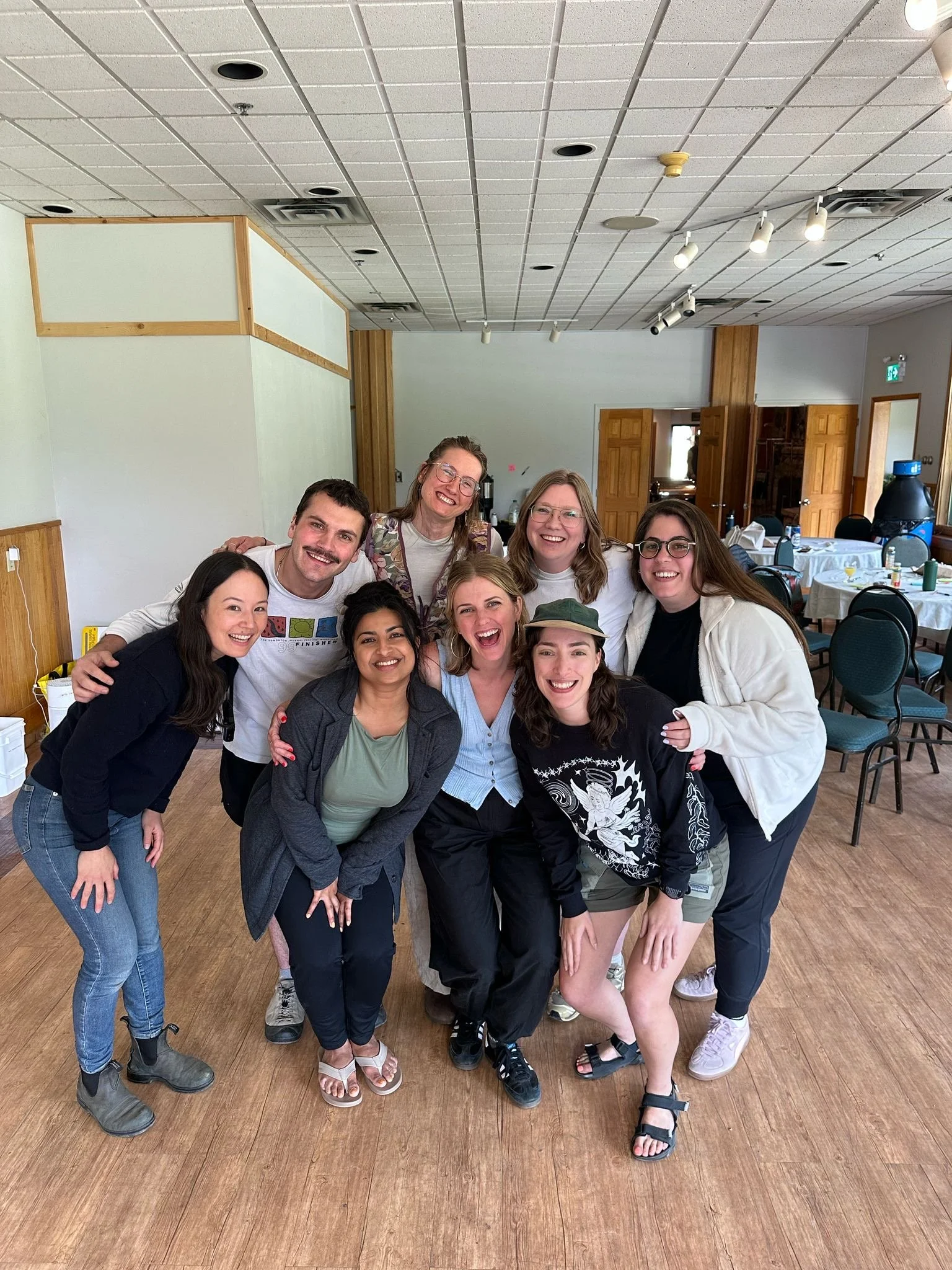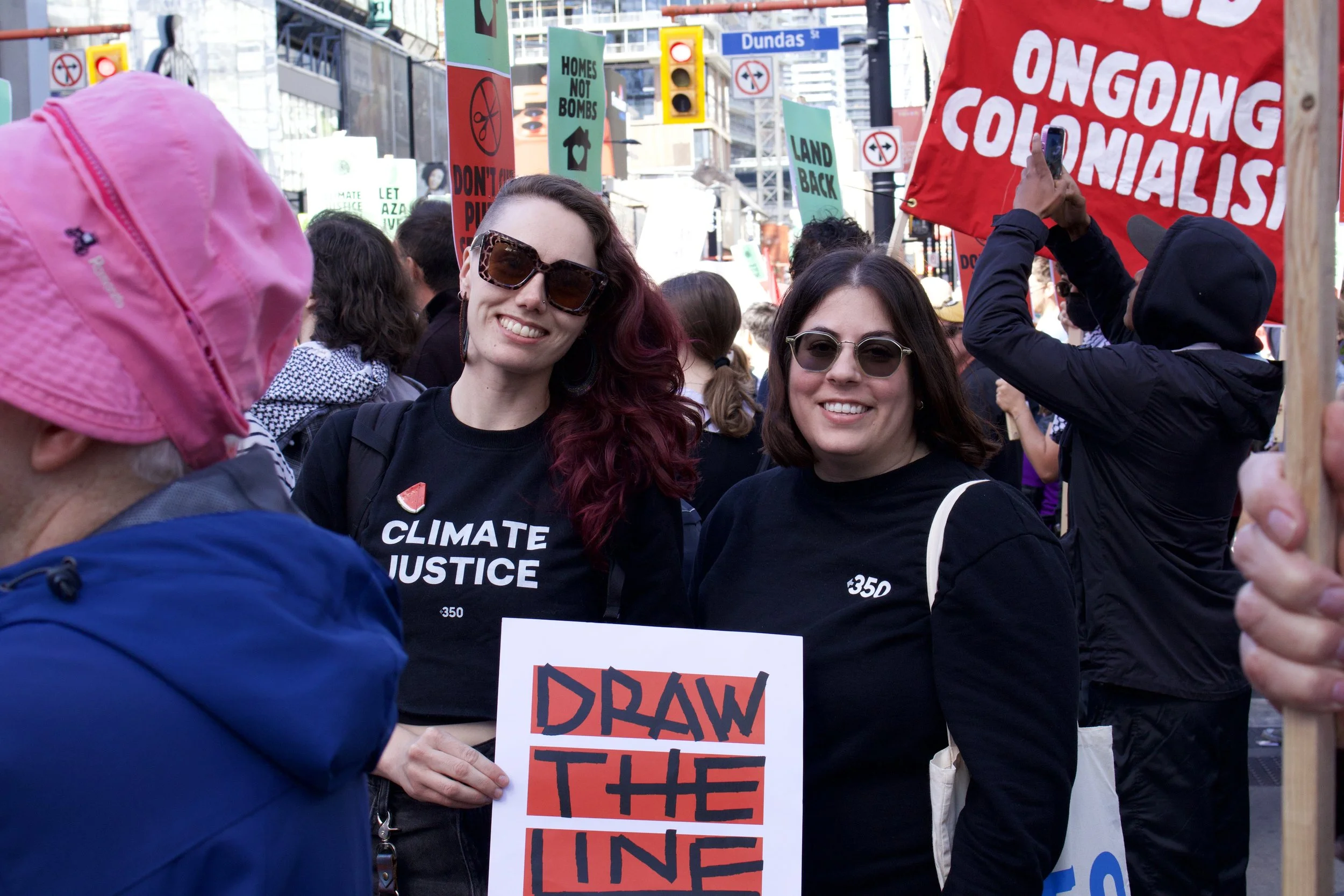Amara Possian
… is passionate about developing the next phase of organizing strategies for Canada’s climate movement.
Signing up for 350 Canada’s All of Us campaign for a Canadian Green New Deal is the beginning of an organizing journey. After receiving a welcome email, the user is invited to participate in weekly actions: in February, sending messages to the Liberal leadership race contenders asking them to fight for a Green New Deal; later, writing letters to the editor of their local paper; filming stories about why they’re part of the campaign; talking to their neighbours who might be hostile to climate action about how it can create jobs; all supported by an active group chat and monthly (and during the election, weekly) live calls to build community and keep the momentum going.
This is the kind of creative, multi-platform campaign that 350.org has made their calling card over more than a decade of global organizing. But 350’s Canada Team Lead Amara Possian is also clear-eyed about how climate organizing needs to continue to evolve: email-driven campaigns are getting far less reach today, on-campus organizing broke down during the COVID pandemic, and has yet to fully recover. Figuring out creative new approaches to in-person and digital organizing is a key priority for 350’s next chapter, and of the new collaborative project Amara is helping to lead, The Organizing Exchange.
Photo: With some of the 350.org team at Renew Our Power in Brasília -- a global, multilingual gathering sparking community-led renewable energy projects and campaigns around the world. (April 13-17, 2025)
These days, 350 Canada continues to punch above the weight of their small team by staying nimble and embracing creative actions. In November, the fossil fuel industry launched a “Scrap the Cap” online campaign against the federal emissions cap policy: within a day, 350 had put out a “Cap the Crap” website calling out big oil’s hypocrisy – responding faster and more boldly than many of the climate groups that had spent years campaigning for the policy.
After the election, 350 Canada will be focused on supporting the global organization's push to supercharge community-led clean energy projects; they’re also exploring a galvanizing national campaign around something like an East-West clean energy grid that would benefit and connect thousands of communities as they shift away from fossil energy.
(This interview took place in Spring 2025.)
“It's going to be really important for us to push back against the idea that fossil fuels will make us safer. I feel like something that's iconic, like an East-West electricity grid, has the opportunity for local organizing to support it – and then we'll have to figure out how to balance the “no” to pipelines and the “yes” to the grid at the same time.”
Photo: Amara between meetings on Parliament Hill during lobby days with 17 organizations united in calling for an east-west renewable electricity grid that upholds workers’ and Indigenous rights. (Sept 24, 2025)
“It's really important for us to make it clear how climate solutions will actually improve people's lives, from a health perspective, from an affordability perspective. We also, in order to address climate change, need massive government investment and a whole-society approach. And we're living in a time when trust in public institutions is at an all time low, and people don't believe the government is capable of doing big things. And so being able to champion these iconic projects that are only possible if they are publicly owned – it’s our work to make that feel possible.”
Why responding to climate change requires an active government:
On why climate organizers need a new playbook:
“In climate funding, the money is there for policy research and communications – but that’s short-term. And I understand that if you're going to put money towards something, you want to be sure it's going to work. But as organizers, we're in this situation where a lot of things that used to work are no longer working. The playbook has changed.
As somebody who runs lots of trainings, and really loves frameworks, and always has tools in my back pocket to pull out and be like, “Let's try this!” or “Let's think about it this way,” I’ve realized a lot of people and organizations just don't have those tools to draw on. But also, our tools are from a different time. And the only way forward is to experiment and learn in a rigorous way, and then to systematize things that are working. And that work is not funded because it's risky. It might not work. But we have to try, we have to experiment, we have to find the things that don't work in order to find the things that do work.”
“We have to try, we have to experiment, we have to find the things that don't work in order to find the things that do work.”
On developing the Organizing Exchange:
Photo: OrgX’s training team leading our first 2.5-day regional training in B.C., where 45 organizers from 28 organizations sharpened core skills to grow people power and build broad public support for climate action. (June 24-28, 2025)
The landscape that we're working in right now is really, really different than it's been over the last decade. So the curriculum that we’ve been drafting has a pillar that's about building power, a pillar about building leadership and capacity, and then a pillar that's about understanding the landscape that we're operating in. And so layering them together, instead of treating them as separate, is at the heart of the training institute.
The thing I kept saying over and over in these sessions was: “there isn't a silver bullet, we just need to try things.” There's only experimenting, learning and adapting. It's actually a systemic problem – we're not equipped for this moment. We need to build the capacity to meet this moment, try new things, and do more of what's working and let go of what's not working.”
“It's an organizing training institute to boost the climate movement's capacity to build and deploy power through training and upskilling leaders. It's in its first year. We brought together 30 people this spring in Toronto to talk about what we've been trying, how it's going, how we got here. We piloted some practices, we got people to brainstorm some of the tools, we kicked off a community of practice that's meeting in a couple of weeks.
A lot of the frameworks that training institutes share are about building power – people power, narrative power, political power. But the thing that we kept bumping up against was that the tools that people are used to using are not situated in the current context.
Challenges to in-person organizing today:
Photo: With 350 Canada organizer Johanna Lewis at Draw the Line in Toronto -- one of 70 actions across Canada as part of a global day of action uniting across movements to demand a just, safe, and livable future. (Sept 20, 2025)
“There's this puritanical culture on the left. People can't talk to people they disagree with. They can't talk to people in general because they lost those skills during COVID. One of the things COVID did with Gen Z is it broke the mentorship gap that typically exists in universities and colleges, where as you're becoming politicized, you’re mentored by the older generation - that just didn't happen. So we've been realizing that it's not just about returning to 2019. We've got to go way back, and there's so much rebuilding to do.”
Challenges to leadership in today’s difficult conditions:
“I’ve been noticing that people in leadership roles are dropping like flies, because it is a hard time to be a leader. In this moment, where we’re in such a stormy, volatile political context, it is natural to get frustrated and to feel powerless—and there’s a risk that we turn that inward and fight each other because it’s easier, and we feel some sense of control.
Sometimes what we need to do is take a break and reassess, or maybe wait for some of the conditions to change a little bit. But there’s a real risk that instead of taking that pause, leaders are going to bail because we feel like we're carrying the world on our shoulders and there is very little support. I don’t know what funders can do about that, but we need to find ways to back up those who are leading effective teams and experimenting with building power if we have a chance of meeting this moment.”





